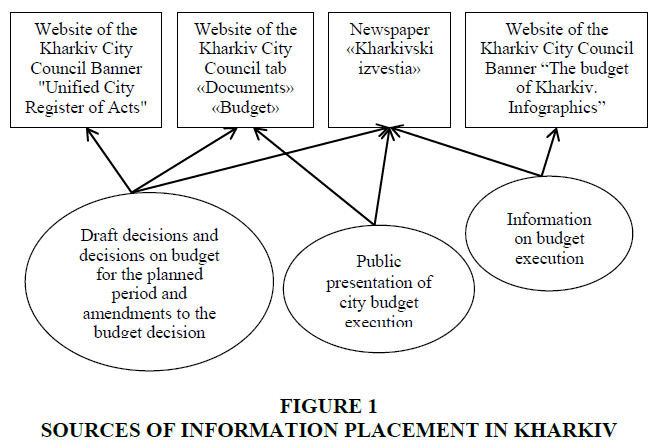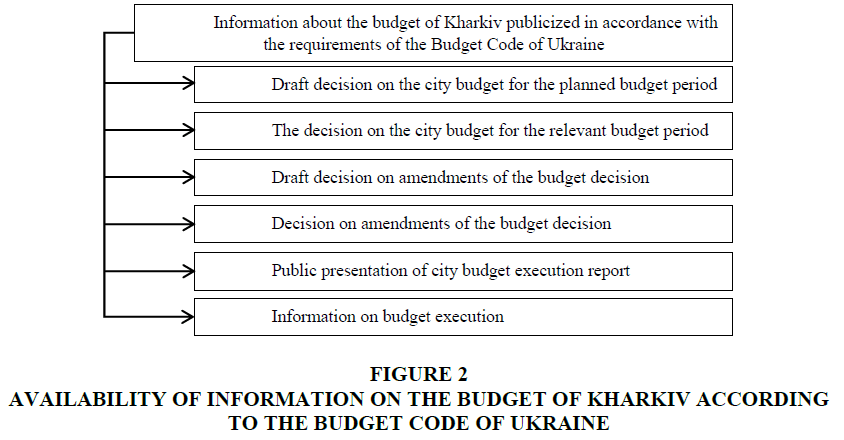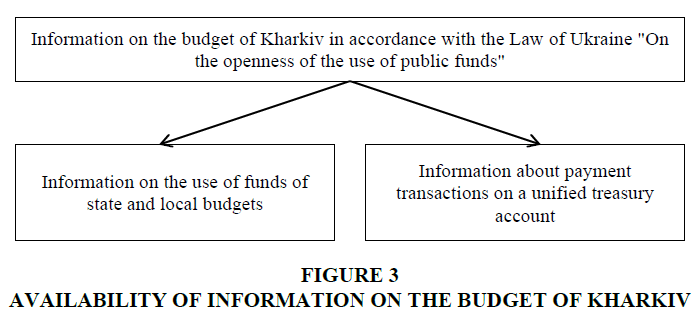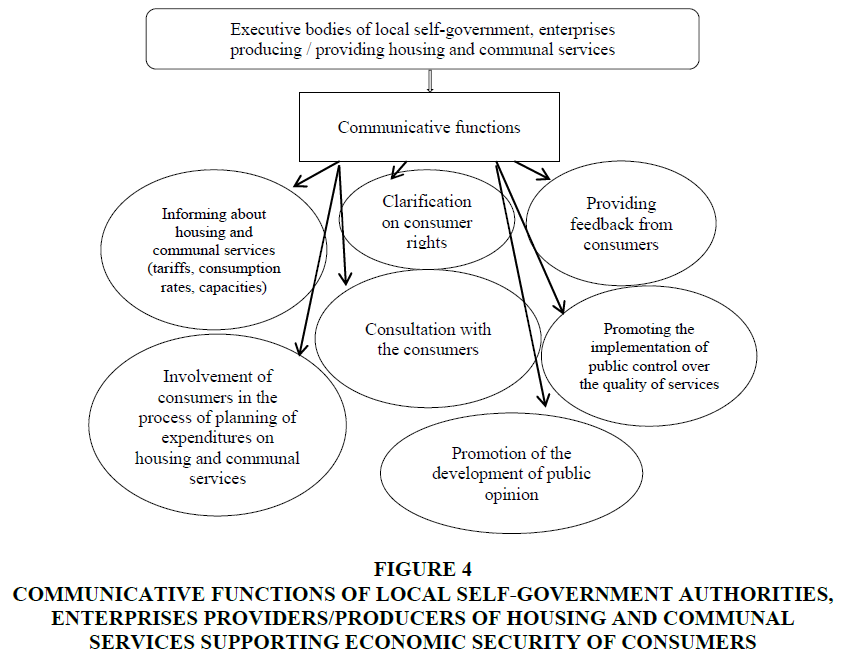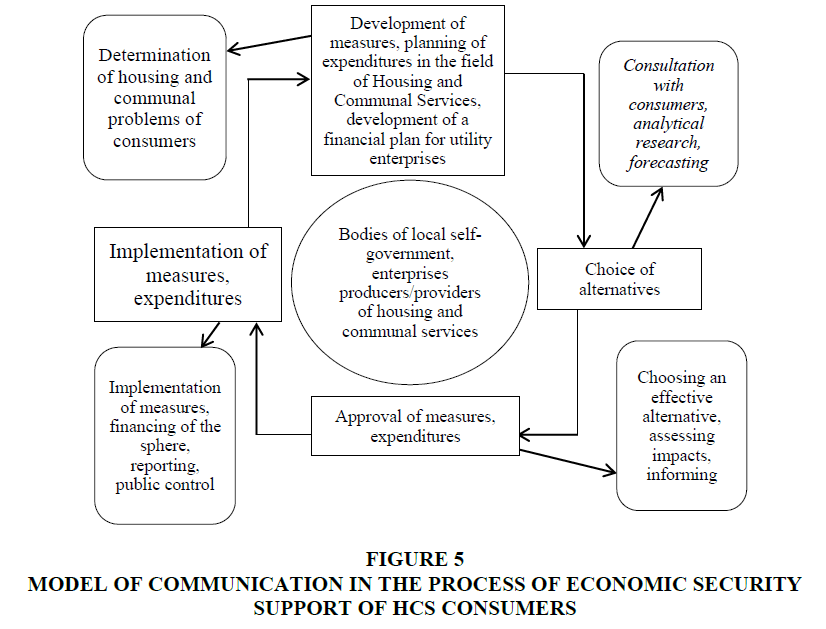Research Article: 2020 Vol: 19 Issue: 2
Information and Communication Support Model of Economic Security of Housing and Communal Services Consumers: International Experience and Domestic Practice
Tetiana Momot, O.M. Beketov National University of Urban Economy
Yevhen Muraiev, O.M. Beketov National University of Urban Economy
Ksenia Savenko, O.M. Beketov National University of Urban Economy
Galina Shapoval, O.M. Beketov National University of Urban Economy
Nataliia Chekh, O.M. Beketov National University of Urban Economy
Abstract
The paper deals with the role consumers of housing and communal services to induce communication for managerial decisions optimization on the housing and communal sphere functioning in the condition of lack of openness and accessibility of information resources for the consumer. The main purpose of the study is to determine the impact of the state information and communication system on the provision of economic security of housing and communal services consumers in terms of communication as an effective component of protecting consumers' economic interests in the process of production and/or provision of services, as well as in local authority’s decision making on the functioning and development of housing and communal services. The objectives of the study are the following: to examine the current experience of information provision in the system of interaction between executive bodies of local self-government, enterprises providing/producing housing and communal services with consumers at the level of the administrative-territorial entity: to analyze the sources, channels and levels of access to information on the example of Kharkiv: on the basis of the study of present domestic practice of information sharing of executive bodies of Ukrainian local authorities to discover the weaknesses in the information provision, lack of a dialogue system and trained personnel, absence of scientific approaches and methodological. In particular, taking into account the basic principles of the communicative policy of the leading countries, it has been proposed to form a fundamentally new for Ukraine information and communicative model of relations between consumers and local authorities and producers/providers of services aimed at ensuring economic security of housing and communal services consumers. During the research the following methods were used: abstract-logical analysis, theoretical generalization, systemic and statistical analysis, systemic and statistical analysis, graphical method. The following results were obtained: we proved that the implementation of information and communication support will increase, on the one hand, consumer awareness in the procedural processes of the development and provision of housing and communal services, and on the other hand, the awareness of local authorities about the direct needs of the consumers. The result of the implementation of the development is risk reduction of the poor-quality of housing and communal services, or providence not in full extent and, accordingly, the increase of the level of economic security of housing and communal services consumers. Within the scope of framework of the analysis of the current trends in the development of information and communication support and transformation processes in housing and communal services, it has been proposed to consider housing and communal services consumers as active participant, the expressers of the state of a certain community, a group of people, united by a common interest that have an impact on the course of economic processes, and require consideration when making managerial decisions. The role, functions and methods of communication in the process of elaboration and implementation of decisions by the local self-government bodies in relation to the housing and communal services of the city, starting with the development of measures, planning of expenditures in the sector “Housing and communal services”, ending with control over the implementation of approved measures and expenditures have been determined. The perspective direction of further research will be the development of structural and organizational, personnel, functional aspects of the communication component of ensuring the economic security of consumers. The special attention should be given to the introduction and use of technological capabilities of digitalization for generating, processing, transmitting, storing and visualizing information in the frame of model of communication in the process of economic security support of HCS consumers.
Keywords
Communication, Economic Security, Consumers of Housing and Communal Services, Public Information.
Introduction
The consumer becomes an interested party in the decision-making process that is supposed to promote the development of housing and communal services (HCS) and improve the quality of services. In such conditions the development of the communication system in the sphere of housing and communal services directly concerns not only the interests of local authorities and enterprises of the sector, but also to a large extent the interests of consumers of HCS. Real support of consumers’ economic security of HCS can only be provided in case of their full information awareness at an early stage of the decision-making process (Bulkina et al., 2018). Given this, objective and timely information sharing and dialogue with the consumer is gaining considerable significance. Therefore, it is vitally important to form a fundamentally new model of communication and to develop new approaches to communicative policies of local authorities in relation to consumers of HCS. On the base of our previous research the following hypotheses of our research are formulated (Momot et al., 2018):
H10 The null hypothesis for the study (H10) is there is no significant relationship between the communication system between the provider, the producer of HCS and the end-user (consumer) and the level of economic security of HCS.
H1a The alternate hypothesis (H1a) is there is a significant relationship between a clear communication system between the provider, the producer of HCS and the end-user (consumer) and the level of economic security of HCS.
Theoretical Background
Since the beginning of the twentieth century, the works of many domestic and foreign researchers/specialists in psychology, philosophy, sociology, and mathematics have been devoted to the necessity of understanding of state communicative opportunities as a mean of mutual understanding with society. Scientists are constantly studying a large number of concepts, theories and diverse studies of communication and information processes in society. The most studied are about 40 scientific schools and theories that have been carefully grouped by Kvit (2008), and that are the most popular today for research of communicative processes.
At the same time enough attention is paid to certain aspects, such as: interaction with mass media transparency of state authorities and information technologies in the process of making managerial decisions; development of the system of public relations as an institution of public administration, definition of ways of communication optimization in the interaction of authorities, mass media and the public (Radchenko, 2009).
Moreover, in condition of globalization of information-digital processes Ganchenko & Bodrov (2019) presented an attempt to formulate elements of the concept of the digitalization process regulating, taking into account the influence of stimulating and limiting factors aimed to increasing the productivity of digital technologies application in the field of HCS of the local territory.
Research Objectives
There are three research objectives in this research:
1. To conduct a scientific and theoretical analysis of modern domestic and international experience of state communication systems;
2. To investigate their influence on economic security support of HCS consumers in terms of communication as an effective component of protecting economic interests of consumers in the process of production and provision of services and decision making by authorities local self-government regarding the functioning and development of HCS;
3. To propose new approaches to the development of the communication system “Executive bodies of local self-government, enterprises providers/producers of HCS - consumer” in order to improve the economic security of HCS consumers.
Definition of Previously Unresolved Issues
So far, consumers of HCS have had the status of passive recipients, which is conditioned by the specifics of the Soviet and post-Soviet systems. Therefore, their economic interests were not given any consideration. In the conditions of rising prices and tariffs for HCS and because of evolutionary processes, during which the attitude towards HCS as a sphere of service provision was transformed, the problems of economic security of consumers became of particular importance. One of the components of ensuring economic security is communicative one, which it is proposed to be considered as a continuous system forming process of exercising consumer rights to participate in the formation and implementation of management decisions on the functioning of HCS.
Research Method
This article was based on scientific works of domestic and foreign specialists in the field of communicative processes. In the course of processing, studying and analyzing the accumulated materials, a set of general scientific methods abstract-logical analysis, theoretical generalization, systemic and statistical analysis, systemic and statistical analysis, graphical method combined by a system approach to studying this problem were applied.
Data accumulated from the sources of information published on the official web portals of the administrative-territorial units on the execution of their budget, which contains indicators of the corresponding budget for general and special funds on income and expenditures and lending, financing, as well as indicators on the status of local debt and the provision of local guarantees.
On the base of World Justice Project (2019) (The Rule of Law Index, etc.) data the international models and Ukrainian model of communication are compared and the model of communication in the process of economic security support of HCS consumers is proposed.
Results and Discussion
The process of transferring information and receiving it by the public is called public communication. Whereby, the main channel through which this communication takes place is the mass media.
Mass media, especially at the local level, play an important role in attracting consumers to solve problems in housing and communal services. The main functions of the mass media in the public sphere are informing the consumers of HCS, the interpretation of information (thus mass media influence the recipients of information) and providing the consumer with the possibility to influence the decision makers. The mass media influence on the audience is determined by two concepts: efficiency and effectiveness. Efficiency is a quick reaction of consumers of housing and communal services to public information.
Effectiveness is the degree of the goals set for the audience achievement, and the audience's satisfaction with the received information. The effectiveness can also be related to the suitability of information to the needs of consumers of HCS. Efficiency and effectiveness are mutually linked. It is unlikely to get a quick reaction of the consumer to the disclosed information, if its topic does not meet the consumer's request.
On the other hand, if the information spread by the mass media does not satisfy consumers, then the reaction to it, albeit negative, can be quite operative. One of the means of informing consumers about the use of public funds is the creation of a unified web-portal for the expenditures of public funds.
Information that may be of interest to HCS consumers in terms of housing and communal expenses may be disclosed in the following sections:
1) Information on the use of state funds (a subvention for social and economic development, in terms of use on objects of housing and communal purposes);
2) Information on local budgets implementation in the field of HCS;
3) Information on the funds uses of communal ownership economic entities of HCS.
Information about local budget, defined in art. 28 of the Budget Code of Ukraine (Legislation of Ukraine, 2019) is publicly disclosed with the observance of the requirements of the Law of Ukraine “On access to public information” (Law of Ukraine, 2019a) as regards the disclosure of public information in the form of open data. The conditions and procedures for ensuring access to information on the use of local budget funds are determined by the Law of Ukraine “On the openness of the public funds use” (Law of Ukraine, 2015).
The sources of information on decisions on the budget, and the report on budget execution in Kharkiv include newspapers and the Internet; details are shown in Figure 1.
At present, information published on the websites of the administrative-territorial units on the execution of their budget contains indicators of the corresponding budget for general and special funds on income (in detail, by types of income, which ensure receipt of not less than 3 percent of the total volume of revenues of the relevant budget) and expenditures and lending (detailed in groups of functional classification of expenditures and budget lending), financing, as well as indicators on the status of local debt and the provision of local guarantees. Such indicators are given in comparison with similar indicators for the corresponding period of the previous budget period, indicating the dynamics of their change. For example, information on the budget of Kharkiv is now highlighted as follows (Figure 2).
Figure 2 Availability of Information on the Budget of Kharkiv According to the Budget Code of Ukraine
Information on the specified sections may be stored in a free-access mode within three years from the date of promulgation. According to the Law of Ukraine “On the openness of the use of public funds” (Law of Ukraine, 2015), the information on the budget of Kharkiv is publicized as follows (Figure 3).
Functional capabilities of the web portal (Official website of the Kharkiv City Council, 2019) provide:
1) The possibility of placing information by entities providing information on the use of public funds in the form of data sets (electronic documents) organized in a format that allows them to be automatically processed by electronic means (machine reading) for the purpose of the re-use;
2) Systematization of the disclosed information;
3) The possibility of searching information by different criteria, time of disclosure, context;
4) Presentation of information in a convenient for perception form;
5) protection of information from unauthorized access, destruction, modification and blocking of access to it through the implementation of organizational and technical measures, implementation of means and methods of technical protection of information;
6) Registration of events occurring on the web-portal and relating to its security.
However, for today, many consumers of services provided by local self-government bodies, and first of all, housing and communal services, are increasing their interest in real problems. Ensuring economic security of HCS consumers is one of the main issues of urban life, because they concern almost every citizen.
The solution of these problems is impossible without a clear communication system between the provider, the producer of HCS and the end user, while the active and meaningful participation of the members of local communities in the process of creating such a system is a key to success. But the public can not be active without being properly informed and aware about the activities of housing and communal enterprises and the use of budget funds.
It seems that the importance of informing consumers to get the public support of processes aimed at the development of HCS in the city should not be questioned. However, informational and educational work concerning the state and problems of housing and communal enterprises, goals and objectives of local self-government bodies aimed at the stable functioning of the housing and utilities sector in many cities are not yet effective. One of the reasons for such a situation is unreadiness for this work of a significant part of the heads of housing and communal enterprises.
Consumers need not only reliable, but also intelligible information, and the material should be presented in a more accessible language, with the specification of the information on the problem. Accordingly, the effectiveness of public participation in solving HCS problems will depend largely on how accessible and understandable for consumers is presented by service provider’s information on the state and problems of HCS, the goals and objectives of the transformation, and the expected results. The core of public relations activity is the impact on public opinion. This impact can be done in order to:
1) Convince consumers to change their mind about any problem or organization;
2) Form a public opinion when it is absent;
3) To strengthen the existing opinion of consumers, to make it clearer and more profound.
Thus, when influencing public opinion, it is necessary to take into account the following features:
1) The work with public opinion must be performed constantly, it is not enough to form it once, because it is changeable;
2) The most significant change in public opinion is due to events;
3) There is no single and unified broad public, the impact on public opinion should be targeted at specific groups of the public;
4) Public opinion is determined by the interests of the public.
The research of modern domestic practice of implementing communication by the Ukrainian executive bodies of the local authorities indicates some shortcomings in the presentation of information, lack of a dialogue system and trained personnel, lack of scientific approaches and methodological support. The need for significant changes in the forms and methods of consumers participation in the management of the city's housing and communal services was dictated by the entry into force of the Law of Ukraine “On access to public information” (Law of Ukraine, 2019a) and amendments to the Law of Ukraine “On information” (Law of Ukraine, 2019b), but these did not become a guide to actions for governing bodies of local self-government. Information resources are now available to the consumer, opening opportunities for him, adding competence and arguments for the implementation of the constitutional right to participate in the formation and implementation of management decisions on the functioning of the housing and communal sphere, monitoring and evaluation, control over the activities of the authorities, developing proposals for optimization making managerial decisions.
Therefore, there is a need to develop a communication model of type: “city authorities (executive bodies of local self-government, enterprises producers/providers of housing and communal services) - consumer of HCS”, which would take into account both historical background and the unique present-day experience gained recently.
It is clear that a purely Swedish, French or British model of communication will not work, but the basic principles of the communicative policies of the leading countries are needed to create a model that would allow HCS consumers according with the democratic laws to communicate with the executive bodies of local authorities and enterprises providers/producers at a level that is capable of protecting their economic interests.
According to the open government index, the ranking compiled by the non-governmental organization World Justice Project (2019), the Netherlands in 2012-2013 ranked second, after Sweden of 97 countries. The index includes indicators such as publicity and availability of laws, stability of laws, right to apply to the government and public participation, availability of official information upon request. Ukraine in this ranking ranks sixty second positions (Table 1).
| Table 1 Summary Information on the Open Government Index of Sweden, Netherlands and Ukraine | |||
| Country | Sweden | Netherlands | Ukraine |
| Index | 0.93 | 0.90 | 0.44 |
| Position | 1/97 | 2/97 | 62/97 |
| Some indicators | |||
| Publicity and accessibility of laws | 0.95 | 0.87 | 0.41 |
| Stability of laws | 0.95 | 0.93 | 0.49 |
| The right to appeal to the government and civil participation | 0.96 | 1.00 | 0.27 |
| Availability of official information upon request | 0.89 | 0.81 | 0.57 |
The Dutch system of advisory and deliberative bodies provides the government with numerous channels for receiving external ideas and proposals (Netherlands, 2019). In the Netherlands, the horizontal coordination mechanism (network interaction) in the relationship between the state and society is recognized as more important than the vertical one (hierarchy). Also, in state administration an integral part of management activity is delegation of powers to those organizational levels that are the best for making operational decisions. Therefore, the responsibility for decision-making is universally accepted principle (State funding in Netherlands, 2013). Directly knowing the needs of citizens in information (by answering questions), the Service more effectively consults the public authorities on the directions and content of information and communication activities.
According to a national sociological survey (2010), 87% of Norwegians are satisfied with Norway as a country for life, 80% have expressed similar satisfaction with their municipalities. For comparison: during the same period, only 44.2% of Ukrainians were in all likelihood and quite satisfied with the life in their populated locality. There were no questions about satisfaction with the country as a whole (Vorona & Shulga, 2010). Undeniably, such indicators are the result primarily of state policy aimed at satisfying the needs of citizens. The state communicative policy of the country is not an exception. In October 2009, the Norwegian Ministry of Government Administration and Reform (Fornyings- og administrasjonsdepartementet) officially announced the adoption of a new Central Government Communication Policy. The purpose of the new policy was to provide such "communicative" guarantees to citizens as:
- Getting clear information about their rights, responsibilities and opportunities;
- Access to information on the activities of public authorities;
- The opportunity to participate in the development of public policy, and in the discussion of certain agreements and services.
The main principle is: “Citizens should not “beg with an outstretched hand” the state”. Public authorities in their work must respect and recognize citizens as equal. The communicative policy of Norway is aimed at forming a perception of public administration open to participation. The state should use social media and an information sharing culture on the Internet, which will facilitate broad engagement in public debate and active dialogue with citizens (The Norwegian Citizen Survey, 2010).
In the course of the communication industry research, there is a need to focus on the existence of two models of information sharing. Upon that, the information model is characterized by the subject-object monologue type of relations with one-sided communication, and communicative model by subjective-subjective dialogical type with feedback (Dniprenko, 2008). From a philosophical point of view, the concept of communication is considered as the concept of “feedback”, which includes an active participation of the addressee, the subject, under the influence of whom relevant information is modified.
In order to ensure economic security of housing and communal services consumers, it becomes necessary to form a fundamentally new model of public communication of equal subjects (horizontal) and to develop new approaches to state policy in this area, the communicative policy of local authorities in relation to housing and communal services consumers. (Figure 4)
Figure 4 Communicative Functions of Local Self-Government Authorities, Enterprises Providers/Producers of Housing and Communal Services Supporting Economic Security of Consumers
There is an urgent need to develop a new paradigm of housing and communal services management in the field of information and communication. In modern economic conditions, the communicative component should replace the informative one. This circumstance has a number of clear explanations.
Firstly, in the system of development, adoption and implementation of management decisions, communication holds a fundamental place. At the state level, communicative policy is given a special priority that is focused not only on the information sphere or public relations, but covers all branches of public administration, including local government. “Communication is an indirect and purposeful interaction between two entities, which can take place both in real time and in virtual space and time” says by Ukrainian researcher Bebyk (2004).
Secondly, communication is an integral part of the performance of executive branch of local government, as it promotes the establishment and maintenance of permanent links between it and the city's territorial community through special information sharing. The communication interconnections between local authorities and the local community are now gaining new forms and formats of public participation in the processes of development and implementation of measures in the field of HCS.
The effectiveness of cooperation between authorities and consumers of housing and communal services is possible under the conditions of active participation of the latter in the process of development and implementation of the city development strategy. Active communicative participation is the influence of citizens on the functioning of the executive system of local self-government authorities, in the process of forming the concepts of development of territorial-administrative units, development of measures, decision-making. It is an effective mechanism that impels local authorities to act in the interests of the community, to ensure the economic security of consumers in various fields of activity.
Thus, it is possible to define the role of communication in economic security support of HCS consumers as a process of transferring and sharing specialized sector information circulating between consumers and authorities, between links of local government systems, as well as between associations of consumers and individuals. Communication is an integral part of public administration, the basis of which is the decision-making process, the consumers’ impact on which can reduce such risks as: provision of poor-quality housing and communal services, provision not in full extent and other, accordingly, to increase the level of economic security of HCS consumers.
Communication is present at all stages of the development and implementation of decisions regarding the HCS of the city, from the development of measures, planning of expenditures in the sector “Housing and Communal Services”, ending with control over the realization of approved measures, expenditures. The role and methods of communication in the process of economic security support of consumers are presented in Figure 5.
Engaging consumers of housing and communal services in the development and implementation of managerial decisions, it becomes necessary to determine their status. In modern conditions, consumers of HCS turn into active participants, the expressers of the state of a certain community, a group of people, united by a common interest that have an impact on the course of economic processes, and require consideration when making managerial decisions.
The communicative component of the economic security of HCS consumers is implemented by communicative units of executive bodies of local self-government. With the help of feedback channels, the economic interests and wishes of consumers should be brought to the self-government authorities, thereby influencing the adoption of appropriate management decisions. The current orientation of the country on international standards of democratic governance requires from the executive bodies of local self-government competent work of communicative units that would have the ability to provide an effective dialogue, both with the mass media, housing and communal services consumers, and their associations. The duties of the staff of the communicative units and the qualification requirements for their personnel selection also require improvement.
An important matter of implementation of the communicative component of economic security support of consumers should be carrying into effect the priority of strategic methods covering the study and analysis of the state of the housing and communal complex, interests and wishes of service users, generalization of the results of sociological, psychological, economic research, development of perspective programs of educational, information and propaganda work among consumers and their associations. With the help of the development of a network of independent analytical centers, the openness and transparency of the functioning of the housing and communal services will increase, and, most importantly, the quality of the public expertise of the process areas, where there is a threat to the economic security of consumers, will also increase. That is, it will promote better consumer awareness in the procedural processes of developing, providing housing and communal services.
Conclusions
In essence, on the base of our research we proved the alternate hypothesis: the clear communication system between the provider, the producer of HCS and the HCS end user (consumer) significantly increases the level of economic security of HCS. Communication system is viewed as the model that integrated process of transferring and sharing specialized sector information circulating between HCS consumers and authorities, between links of local government systems, as well as between associations of HCS consumers and individuals.
An important condition for the efficient functioning of the communicative component of ensuring the economic security of housing and communal services consumers in Ukraine is the development and implementation of effective mechanisms for the coordination of communicative activities of executive bodies of local self-government, institutional provision and legal regulation of this process.
To summarize, the system of communication between consumers and local governments, producers/providers of HCS services requires new structural, organizational, personnel, functional and methodological approaches, as well as adaptation to the best international practices and legislation, the use of innovative technologies, with sufficient financial and logistical provision, development of a unified system of professional training of specialists, that is a promising direction for further research. On the future research the special attention should be given to the digital technologies application in the field of HCS communication system of the local territory.
References
- Bebyk, V. (2004). To the problem of communication and its functions in society. Personal, 3, 28-33.
- Bulkina, I., Savenko, K., & Chepeliuk, M. (2018). Risk-oriented approach to providing economic security to consumers of housing and utility services: analysis of international experience and modern implemetation practice. Financial and Credit Activity: Problems of Theory and Practice, 2(25), 74-81.
- Dniprenko, N.K. (2008). Communication: democratic standards in the work of public authorities. TOV “Vistka”.
- Ganchenko, D.N., & Bodrov, A.A. (2019). Digitalization of housing and communal services in the context of new industrialization. In 1st International Scientific Conference “Modern management trends and the digital economy: From regional development to global economic growth” (MTDE 2019). Atlantis Press.
- Kvit, S. (2008). Mass communications. Kyiv:“Kyyevo-Mohylianske academia”.
- Law of Ukraine. (2015). On the openness of the use of public funds. http://zakon3.rada.gov.ua/laws/show/183-19
- Law of Ukraine. (2019a). On access to public information. https://zakon.rada.gov.ua/laws/show/2939-17?lang=en
- Law of Ukraine. (2019b). On information. https://zakon.rada.gov.ua/laws/show/2657-12?lang=en
- Legislation of Ukraine. (2019). Budget code of Ukraine. https://zakon.rada.gov.ua/laws/show/2456-17?lang=en
- Momot, T.V., Chudopal, A.I., Panov, V.V., & Leleta, A.V. (2018). A stakeholder-oriented approach to ensuring economic security in the housing and utilities sector. KhNAU Bulletin. Series: Economic Sciences, (1), 90-104.
- Netherlands. (2019). http://www1.worldbank.org/publicsector/civilservice/rsNetherlands.pdf
- Official Website of the Kharkiv City Council. (2019). http://www.city.kharkov.ua/uk/
- Radchenko, O. (2009). Democratic transit as mechanism of reforming of public administration: World models and problems of application. Scientific bulletin: Democratic Management, (3), 65-72.
- The Norwegian Citizen Survey. (2010). http://vakokybe.vrm.lt/get.php?f.312
- Vorona, V., & Shulga, M. (2010). Ukrains ’ke Sylvage 1992–2010. Sostiological Monitoring
- World Justice Project (2019). The rule of law index. http://worldjusticeproject.org/rule-of-law-index
